“无灵主语”与翻译解读
- 格式:pdf
- 大小:10.14 MB
- 文档页数:97
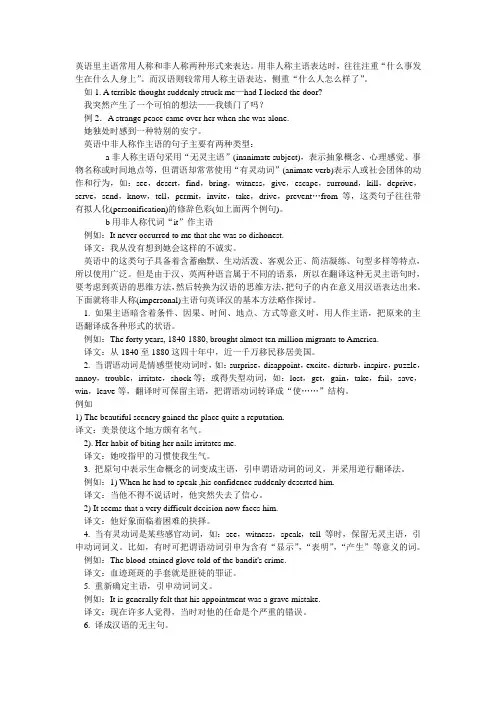
英语里主语常用人称和非人称两种形式来表达。
用非人称主语表达时,往往注重“什么事发生在什么人身上”。
而汉语则较常用人称主语表达,侧重“什么人怎么样了”。
如1. A terrible thought suddenly struck me—had I locked the door?我突然产生了一个可怕的想法——我锁门了吗?例2.A strange peace came over her when she was alone.她独处时感到一种特别的安宁。
英语中非人称作主语的句子主要有两种类型:a非人称主语句采用“无灵主语”(inanimate subject),表示抽象概念、心理感觉、事物名称或时间地点等,但谓语却常常使用“有灵动词”(animate verb)表示人或社会团体的动作和行为,如:see,desert,find,bring,witness,give,escape,surround,kill,deprive,serve,send,know,tell,permit,invite,take,drive,prevent…from等,这类句子往往带有拟人化(personification)的修辞色彩(如上面两个例句)。
b用非人称代词“it”作主语例如:It never occurred to me that she was so dishonest.译文:我从没有想到她会这样的不诚实。
英语中的这类句子具备着含蓄幽默、生动活泼、客观公正、简洁凝练、句型多样等特点,所以使用广泛。
但是由于汉、英两种语言属于不同的语系,所以在翻译这种无灵主语句时,要考虑到英语的思维方法,然后转换为汉语的思维方法,把句子的内在意义用汉语表达出来。
下面就将非人称(impersonal)主语句英译汉的基本方法略作探讨。
1. 如果主语暗含着条件、因果、时间、地点、方式等意义时,用人作主语,把原来的主语翻译成各种形式的状语。
例如:The forty years, 1840-1880, brought almost ten million migrants to America.译文:从1840至1880这四十年中,近一千万移民移居美国。
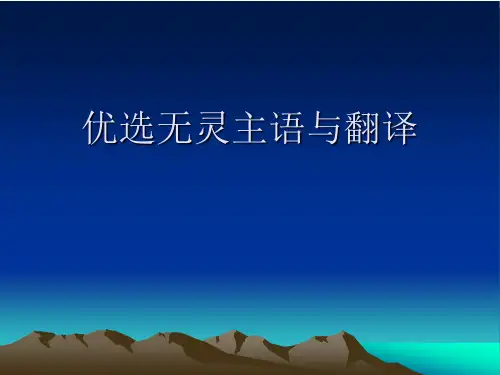

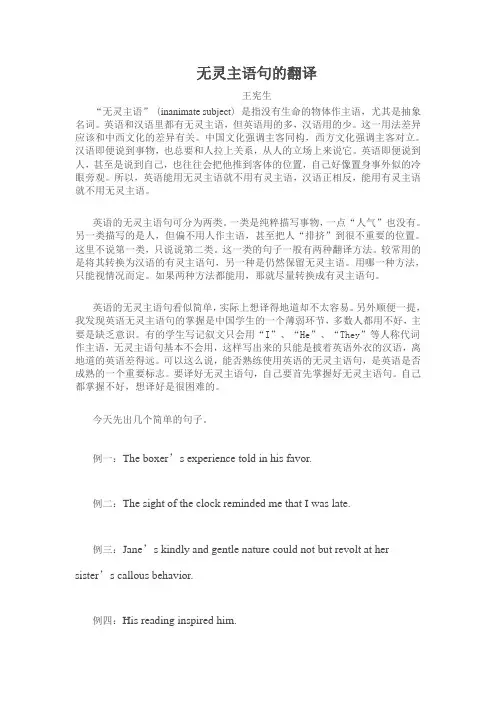
无灵主语句的翻译王宪生“无灵主语” (inanimate subject) 是指没有生命的物体作主语,尤其是抽象名词。
英语和汉语里都有无灵主语,但英语用的多,汉语用的少。
这一用法差异应该和中西文化的差异有关。
中国文化强调主客同构,西方文化强调主客对立。
汉语即便说到事物,也总要和人拉上关系,从人的立场上来说它。
英语即便说到人,甚至是说到自己,也往往会把他推到客体的位置,自己好像置身事外似的冷眼旁观。
所以,英语能用无灵主语就不用有灵主语,汉语正相反,能用有灵主语就不用无灵主语。
英语的无灵主语句可分为两类。
一类是纯粹描写事物,一点“人气”也没有。
另一类描写的是人,但偏不用人作主语,甚至把人“排挤”到很不重要的位置。
这里不说第一类,只说说第二类。
这一类的句子一般有两种翻译方法。
较常用的是将其转换为汉语的有灵主语句,另一种是仍然保留无灵主语。
用哪一种方法,只能视情况而定。
如果两种方法都能用,那就尽量转换成有灵主语句。
英语的无灵主语句看似简单,实际上想译得地道却不太容易。
另外顺便一提,我发现英语无灵主语句的掌握是中国学生的一个薄弱环节,多数人都用不好,主要是缺乏意识。
有的学生写记叙文只会用“I”、“He”、“They”等人称代词作主语,无灵主语句基本不会用,这样写出来的只能是披着英语外衣的汉语,离地道的英语差得远。
可以这么说,能否熟练使用英语的无灵主语句,是英语是否成熟的一个重要标志。
要译好无灵主语句,自己要首先掌握好无灵主语句。
自己都掌握不好,想译好是很困难的。
今天先出几个简单的句子。
例一:The boxer’s experience told in his favor.例二:The sight of the clock reminded me that I was late.例三:Jane’s kindly and gentle nature could not but revolt at her sister’s callous behavior.例四:His reading inspired him.例五:Fortune smiled on him.例六:Aimlessness and failure marked Hitler’s early life.例七:Childhood dearly loves a tale; for its simple heart finds the way out of a reality it does not understand by contriving a world of make-believe.A Research on the International Competitive Power of Transportation Service Exports from Guangdong ProvinceAbstract: Guangdong, as the largest import and export trading power in China, has seen further expansion in international trade in the 21st century, especially after China became a member country of WTO. Since the 90's of the last century, with the rapid development of information technology, transportation service exports has been flourishing globally. Guangdong, being one of the forerunners in Chinese economic reform, shows the state of affairs in the field of international transportation exports.Based on the analysis of development status of transportation service exports from Guangdong, of the necessity of tapping into transportation service exports, of the international competitive power and competitive edge of Guangdong in the field of transportation service exports, I putforward the strategy of improving the international competitive power of Guangdong in transportation service exports.Keywords: Guangdong Province, transportation service, service exports, international competitive power。
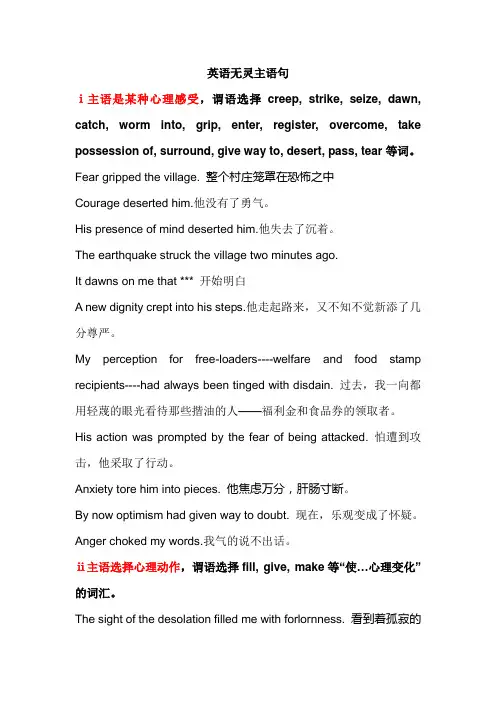
英语无灵主语句ⅰ主语是某种心理感受,谓语选择creep, strike, seize, dawn, catch, worm into, grip, enter, register, overcome, take possession of, surround, give way to, desert, pass, tear等词。
Fear gripped the village. 整个村庄笼罩在恐怖之中Courage deserted him.他没有了勇气。
His presence of mind deserted him.他失去了沉着。
The earthquake struck the village two minutes ago.It dawns on me that *** 开始明白A new dignity crept into his steps.他走起路来,又不知不觉新添了几分尊严。
My perception for free-loaders----welfare and food stamp recipients----had always been tinged with disdain. 过去,我一向都用轻蔑的眼光看待那些揩油的人——福利金和食品券的领取者。
His action was prompted by the fear of being attacked. 怕遭到攻击,他采取了行动。
Anxiety tore him into pieces. 他焦虑万分,肝肠寸断。
By now optimism had given way to doubt. 现在,乐观变成了怀疑。
Anger choked my words.我气的说不出话。
ⅱ主语选择心理动作,谓语选择fill, give, make等“使…心理变化”的词汇。
The sight of the desolation filled me with forlornness. 看到着孤寂的景象,我心中满是凄凉。
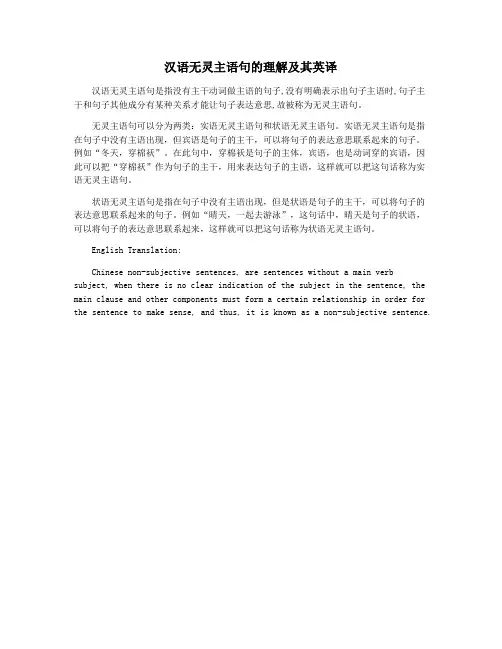
汉语无灵主语句的理解及其英译
汉语无灵主语句是指没有主干动词做主语的句子,没有明确表示出句子主语时,句子主干和句子其他成分有某种关系才能让句子表达意思,故被称为无灵主语句。
无灵主语句可以分为两类:实语无灵主语句和状语无灵主语句。
实语无灵主语句是指在句子中没有主语出现,但宾语是句子的主干,可以将句子的表达意思联系起来的句子。
例如“冬天,穿棉袄”。
在此句中,穿棉袄是句子的主体,宾语,也是动词穿的宾语,因此可以把“穿棉袄”作为句子的主干,用来表达句子的主语,这样就可以把这句话称为实语无灵主语句。
状语无灵主语句是指在句子中没有主语出现,但是状语是句子的主干,可以将句子的表达意思联系起来的句子。
例如“晴天,一起去游泳”,这句话中,晴天是句子的状语,可以将句子的表达意思联系起来,这样就可以把这句话称为状语无灵主语句。
English Translation:
Chinese non-subjective sentences, are sentences without a main verb subject, when there is no clear indication of the subject in the sentence, the main clause and other components must form a certain relationship in order for the sentence to make sense, and thus, it is known as a non-subjective sentence.。


![什么是无灵主语[整理版]](https://uimg.taocdn.com/f1a7616ac77da26924c5b030.webp)
什么是无灵主语[整理版]什么是无灵主语,无灵主语的概念极为简单:有无生命的事物做主语来展开句子。
其实它向我们传达的只是一种思维,一种思考的方式而已。
什么是无灵主语, Eg: I love everbody.译为:我爱大家。
如果出现在口语中,这样的表达当然最为清晰,但如果出现在写作中,如下表达可能更为生动一些:My love goes to everbody.从例子可以看出,用客观的事物love代替有生命的I,这就是无灵主语的实质。
但我们为什么要使用无灵主语,它究竟有什么优点呢, (1)增加主语的多样性。
往往在写作时,我们会反复用同一有生命的词作主语,使语句显得单调,重复。
这些总在不经意之间常常发生。
Eg: We don’t think so.If we want light,we must conquer darkness. 三个we的使用,使句子显得平淡,甚至别扭,但如果稍加变动,句子会显得协调的多。
? We don’t think so.If we want light,darkness must be conquered. ? This idea can’t acquire our ac ceptance,If we want light,we must conquer darkness. (2)使语言更生动化。
将无生命的事物作主语而展开的句子,往往会用上比喻、拟人等修辞手法,语言随之提升一个档次。
Eg: 青少年常常沉迷于网络。
Indulge(sb) in, be addicted in; Be absorbed in; pay attentionto;concentrate on.Internet is Pandora’s Box for youth. 这也就是无灵主语的难点所在,也是华丽之处:并不是简单的主动语态变为被动语态,而是用主动语态去表达被动意义。
Eg: People accepted the fact.人们接受这个事实。
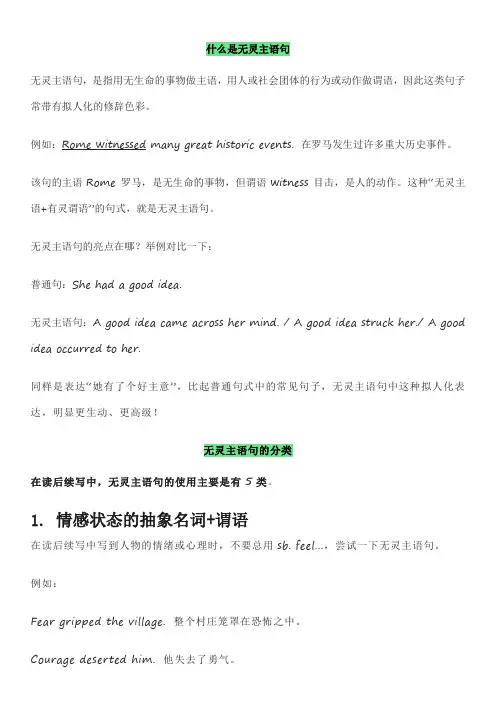
什么是无灵主语句无灵主语句,是指用无生命的事物做主语,用人或社会团体的行为或动作做谓语,因此这类句子常带有拟人化的修辞色彩。
该句的主语Rome罗马,是无生命的事物,但谓语witness目击,是人的动作。
这种“无灵主语+有灵谓语”的句式,就是无灵主语句。
无灵主语句的亮点在哪?举例对比一下:普通句:She had a good idea.无灵主语句:A good idea came across her mind. / A good idea struck her./ A good idea occurred to her.同样是表达“她有了个好主意”,比起普通句式中的常见句子,无灵主语句中这种拟人化表达,明显更生动、更高级!无灵主语句的分类在读后续写中,无灵主语句的使用主要是有5类。
1. 情感状态的抽象名词+谓语在读后续写中写到人物的情绪或心理时,不要总用sb. feel...,尝试一下无灵主语句。
例如:Fear gripped the village. 整个村庄笼罩在恐怖之中。
Courage deserted him. 他失去了勇气。
Anger choked my words. 我气得说不出话。
A wave of nervousness washed over him. 一阵紧张的情绪涌上他的心头。
A chill of horror suddenly swept over him. 他突然感到不寒而栗。
Excitement seized him. 他好兴奋。
这种拟人化的描写,将情绪生动地表达出来,在考试中绝对加分!补充一些相关常见词汇,大家续写时,可以根据文中的情绪,挑选恰当的词自行搭配。
常见的情绪名词:happiness, joy, delight 开心快乐surprise, astonishment 惊奇,惊讶shame 羞耻,羞愧anger 愤怒despair 绝望regret 遗憾,后悔sorrow 悲伤horror 惊恐anxiety 焦虑disappointment 失望,沮丧satisfaction 满意,满足puzzlement 困惑不解常见的谓语动词:seize 侵袭choke 噎住,堵住flood 充满creep 不知不觉产生grip 紧抓give way to 被……代替wash over 洗涤,侵袭deserted 丢弃,遗弃2. 思考/动作行为的名词+谓语在读后续写中描写人物动作或思考行为时,也可以使用无灵主语句。
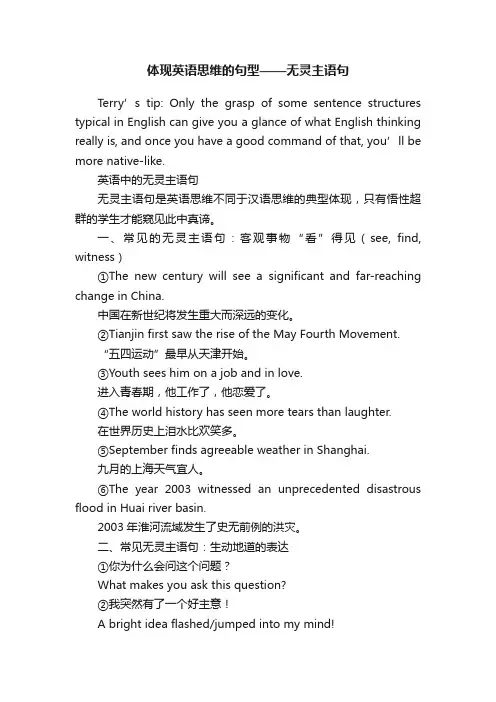
体现英语思维的句型——无灵主语句Terry’s tip: Only the grasp of some sentence structures typical in English can give you a glance of what English thinking really is, and once you have a good command of that, you’ll be more native-like.英语中的无灵主语句无灵主语句是英语思维不同于汉语思维的典型体现,只有悟性超群的学生才能窥见此中真谛。
一、常见的无灵主语句:客观事物“看”得见(see, find, witness)①The new century will see a significant and far-reaching change in China.中国在新世纪将发生重大而深远的变化。
②Tianjin first saw the rise of the May Fourth Movement.“五四运动”最早从天津开始。
③Youth sees him on a job and in love.进入青春期,他工作了,他恋爱了。
④The world history has seen more tears than laughter.在世界历史上泪水比欢笑多。
⑤September finds agreeable weather in Shanghai.九月的上海天气宜人。
⑥The year 2003 witnessed an unpreceden ted disastrous flood in Huai river basin.2003年淮河流域发生了史无前例的洪灾。
二、常见无灵主语句:生动地道的表达①你为什么会问这个问题?What makes you ask this question?②我突然有了一个好主意!A bright idea flashed/jumped into my mind!③我一时想不起他的名字来了。
高考英语写作无灵主句一、定义无灵主语就是用无生命的事物作主语。
【例句】1.Shock deprived me of my power of speech.我惊讶得说不出话来2.Horror rulled the whole room.恐惧笼罩了整个房间。
3.The past three years witnessed our growth.过去的三年见证了我们的成长综上例句所述,无灵主句=无灵主语+有灵动词(+宾语)这类动词常用的为:看见see 发现find带来bring见证witness 给予give逃离escape 包围surround剥夺deprive提供serve发送赠送send告诉/见证tell允许permit邀请invite拿/带take驱使drive阻止prevent 等二、分类无灵主语共有四类第一类表示的情感/状态名词作主语例句:1.我紧张得说不出话来。
Tension choked my words.2.我心中充满了喜悦。
A thrill of joy flooded me.3.她失去了勇气。
Courage deserted her .【练习】他惊慌失措。
【答案】Panic seized him表情感/状态的常见名词汇总:开心 delight 激动 thrill放松 relaxation 满意 satisfaction震惊 shock 悲伤sorrow绝望desperation沮丧 frustration愤怒 rage焦虑 anxiety疲惫exhaustion恐惧 fear/horror困惑 confusion羞愧shame尴尬embarrassment孤独loneliness第二类表示思考/动作行为的名词作主语例句:我脑子里闪过一个可怕的念头An awful thought struck me.我们爬了50分钟到了山顶。
A 50 minutes' climbing brought us to the top of the mountain. 【练习】看到这个情景使我心中充满了幸福。
读后续写之无灵主语无灵主语句=无灵主语+有灵动词“无灵主语”简单理解就是“没有生命力”的东西做主语。
比如时间,地点,自然现象等。
“有灵动词”简单理解就是把没有生命力的东西,赋予有生命力的动作。
比如I love everybody.译为:我爱大家,→My love goes to everybody.中love就是没有生命力的名词,但是go就是有生命力的动词。
(1)第1个优点:增加主语的多样性。
往往在写作时,我们会反复用同一有生命的词作主语,使语句显得单调,重复。
这些总在不经意之间常常发生。
例如We don’t think so.If we want light,we mustconquer darkness.我们并不这么认为。
如果我们想要光明,我们就必须征服黑暗。
三个we的使用,使句子显得平淡,甚至别扭,但如果稍加变动,句子会显得协调的多。
We don’t think so.If we want light,darkness must be conquered.我们并不这么认为。
如果我们想要光明,黑暗就必须被征服。
(2)第2个优点:增使语言更生动化。
将无生命的事物作主语而展开的句子,往往会用上比喻、拟人等修辞手法,语言随之提升一个档次。
这也就是无灵主语的难点所在,也是华丽之处。
需要注意的是,并不是简单的主动语态变为被动语态,而是用主动语态去表达被动意义。
比如:I forgot his name.我们忘了他的名字了。
并不是简单地变为His name was forgotten by me.而应当更为形象的用主动语态表示。
比如我们可以说:“他的名字溜出了我的大脑。
”His name slipped my mind.“他的名字没有在我头脑中扎根。
”His name didn't take root in my mind.其实要写这样的句子并不难,只要掌握这种思想,加上一段时间的练习,肯定会下笔如有神。
无灵主语:转变一个思维,英文表达更地道无灵主语是英文中非常重要的语法结构,但更是一种表达习惯和思维模式。
什么是无灵主语无灵主语这个概念听起来有点玄妙,但说起来却是很好理解,就是以无生命的事物作为主语,来展开句子。
给大家举个例子。
下面这句话:I lost the courage我失去了勇气如果将courage作为主语,改为:courage deserted me勇气弃我而去就是无灵主语,英文中叫做inanimate subject。
这里“无生命的事物”所指比较广泛,抽象概念、心理感受、事物的名称、时间、地点等等,都包括其中。
无灵主语还有一个特点,就是它的谓语动词往往是“有灵动词”,也就是有生命的事物的动作和行为,比如witness(见证)、greet(迎接)、escape(逃走)、motivate(鼓励)、wait(等待)、tell(告诉)等等。
举例来说:a nervous laugh escapes my throat我不由自主紧张地笑了一声The strike killed two militants and wounded two others这次袭击导致两名激进分子死亡,另两人受伤。
句子中laugh(笑)和strike(袭击)是无灵主语,而escape(逃走),kill(杀死),wound(使受伤)则是有灵动词。
无灵主语与中文表达习惯不符无灵主语并不是什么难掌握的语法点,不过中国学生很少在写作中运用,主要是由于这种表达方式不符合中文习惯。
汉语多用人称做主语,侧重表达“人做事”英语则常用非人称做主语,侧重表达“事对人的作用影响”所以在汉语中,“有灵动词”与“无灵动词”有明显区别:看、听、说、来、离开、邀请、剥夺等等是有灵动词,一般只与有灵主语搭配。
出现、发生、存在、变、吸引、上升是无灵动词,多表示出现消失、存在与变化,一般只有它们才可以和无灵主语搭配。
这样的区别,在英文却中常常是模糊的。
英文中无灵主语和有灵动词搭配,是很常见的表达方式。
一、什么是“无灵主语句”无灵主语句是一种特殊的语法结构,其核心特点是用无生命的事物(如情感、动作、时间、地点、物品等)作为主语,而谓语部分则是由人的行为或社会团体的动作构成。
这种结构经常带有拟人化的修辞色彩,使语言描写更加生动形象。
二、“无灵主语句”分类1、情感状态的抽象名词+谓语在续写中写到人物的情绪或心理时,别总用sb. feel xx,不如试试无灵主语句,来个高级的情绪描写。
用在续写中绝对加分!“情感状态的抽象名词+谓语动词”的描写有:①Fear gripped the village.(整个村庄笼罩在恐怖之中)②Courage deserted him. (他失去了勇气)③Anger choked my words. (我气的说不出话)常见的情绪名词:happiness, joy, delight 开心快乐;surprise, astonishment 惊奇惊讶;shame 羞耻羞愧;anger 愤怒;despair 绝望;regret 遗憾后悔;sorrow 悲伤;horror 惊恐;anxiety 焦虑;disappointment 失望沮丧;satisfaction 满意满足;puzzlement 困惑不解;常见的谓语动词:seize 侵袭;choke 噎住堵住;flood 充满;creep 不知不觉产生;grip 紧抓;give way to 被xx代替;wash over 洗涤侵袭;deserted 丢弃遗弃。
2、思考/动作行为的名词+谓语在续写中描写人物动作或思考行为时,也可以整一个无灵主语句,更不错!“思考/动作行为的名词+谓语动词”的描写有:①The sight of the scene filled me with horror. (看到这个情景我心中充满了恐惧)②A terrible thought suddenly struck me. (我突然想到一个可怕的想法)③A ten minutes’walk brought us to the hotel. (我们步行十分钟就到了旅馆)常见的人物行为词汇有:sight 看到,thought 想法,glance 一瞥,look看到,idea 想法,feeling 感受,walk 走路;等等。